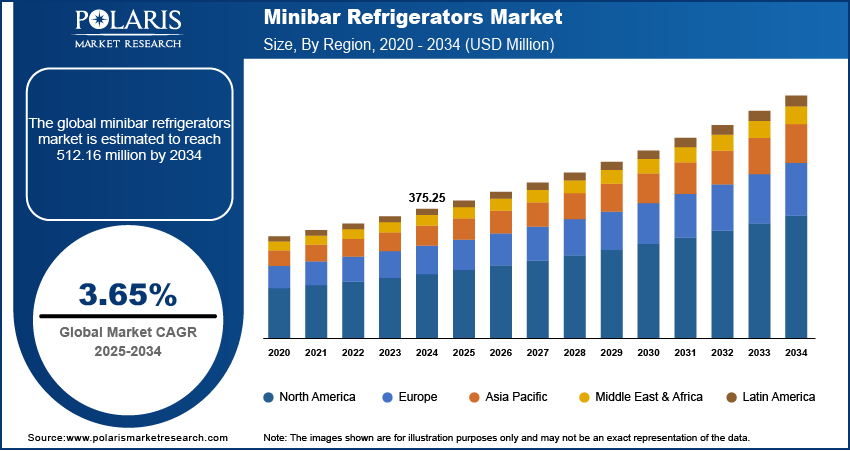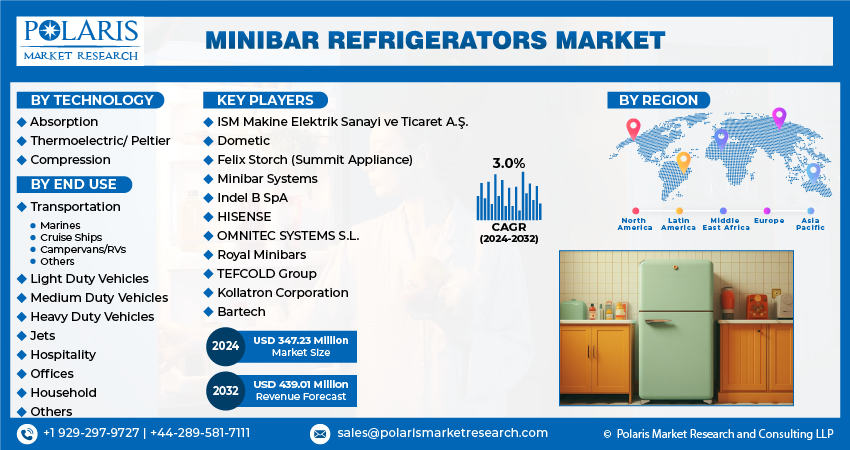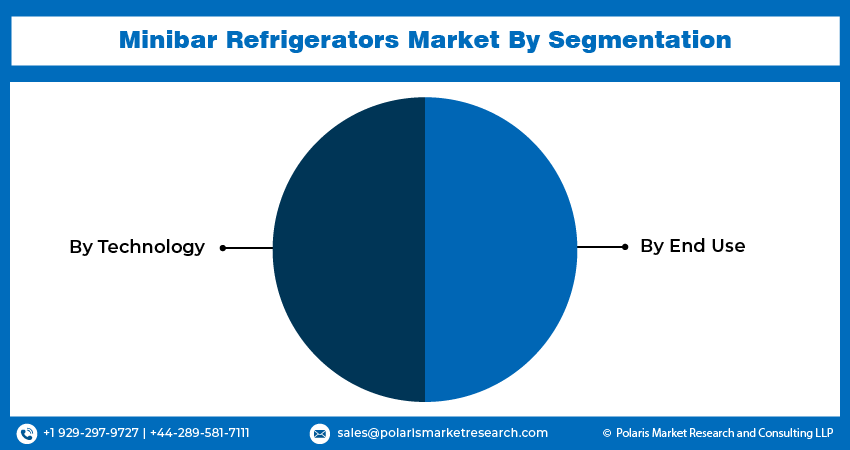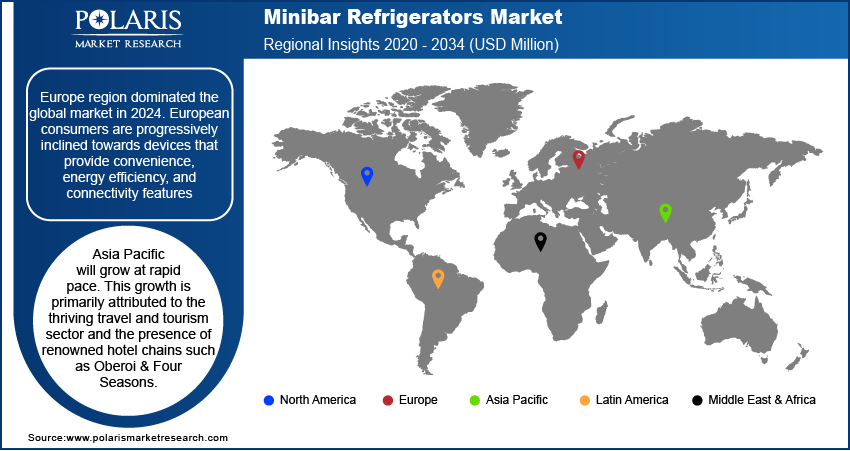
Minibar Refrigerators Market Share, Size, Trends, Industry Analysis Report, By Technology (Absorption, Thermoelectric/ Peltier, Compression), By End-use (Transportation, Hospitality, Offices, Household), By Region, And Segment Forecasts, 2024 - 2032
- Published Date:Jan-2024
- Pages: 118
- Format: PDF
- Report ID: PM4270
- Base Year: 2023
- Historical Data: 2019 – 2022
Report Outlook
The global minibar refrigerators market was valued at USD 337.94 million in 2023 and is expected to grow at a CAGR of 3.0% during the forecast period.
Rapid expansion of the hospitality industry stands out as a significant driver for this growth. Particularly in hotels, there is a distinct focus on the unique designs, personalized services, & immersive themes, all of which contribute substantially to market growth. According to Lodging Econometrics (LE)'s, in 2022, the global construction pipeline for hotels reached 14,267, comprising 2,298,846 rooms. This represented a notable year-over-year growth of 4%. In the market context, these properties prioritize the curation of quality mini-bar offerings that align seamlessly with brand identity. This tailored approach caters specifically to guests who value exclusivity and premium amenities. Consequently, the increasing number of hotels and resorts worldwide has significantly bolstered market growth.

To Understand More About this Research: Request a Free Sample Report
The trend of gatherings & house parties among the U.S. house-holds has resulted in a demand for additional storage space for beverages & frozen snacks during outdoor dining events in places like backyards, terraces, & gardens. Home-owners' growing preference for dedicated cold storages to ensure a continuous supply of drinks & appetizers for special occasions has driven the adoption of minibar fridges in residential settings.
Furthermore, the growing involvement of millennials in the outdoor recreational pursuits and the robust presence of the hospitality industry, particularly hotels, are poised to have a substantial impact on boosting the demand for the mini-fridges in the U.S. Many hotels in the country now offer amenities tailored to meet the preferences for a personalized and comfortable stay. The inclusion of portable mini fridges in hotel rooms caters to guests' needs by providing them with the convenience of the storing snacks, beverages, & medications, thereby enhancing their overall experience.
Traditional cooling systems rely on compressors and working fluids to transfer heat for refrigeration. In this process, thermal fluid is absorbed, and the working fluid, which can pose environmental concerns, is released. However, in this portable mini refrigerator, no such fluids are released into the environment, and it does not produce ozone as a general byproduct. Instead, it utilizes Peltier model coolers, providing several advantages over conventional systems. These coolers are solid-state devices, containing no moving parts, ensuring reliability and quiet operation. Additionally, they can be highly compact, much more so than systems based on compressors.

For Specific Research Requirements, Request for a Customized Research Report
Industry Dynamics
Growth Drivers
Technological Advancements
Technological progress has elevated minibar refrigerators from basic cooling units to sophisticated appliances incorporating state-of-the-art features. Modern minibar refrigerators, for example, are equipped with smart capabilities that enable remote control, monitoring, and restocking. This technology empowers hotels to streamline their operations and offer an improved experience to their guests. Additionally, these appliances can generate consumption data, enabling businesses to optimize restocking processes and minimize wastage.
minibar refrigerators market players have introduced energy-efficient minibar refrigerators to cater to evolving consumer needs. For instance, Dometic Group’s HiPro series offers premium minibars that are not only energy-saving but also do not contain chromate, a corrosion inhibitor commonly used in absorption minibars and recently flagged by the EU. Dometic's HiPro minibar refrigerators are designed for rapid cooling without over-chilling. They feature transparent door racks suitable for 1.5 L bottles, along with adjustable and removable shelves to accommodate various products.
Report Segmentation
The market is primarily segmented based on technology, end use, and region.
|
By Technology |
By End Use |
By Region |
|
|
|

To Understand the Scope of this Report: Speak to Analyst
By Technology Analysis
Absorption technology segment accounted for the noteworthy market share in 2023
Absorption based segment accounted for largest market. Segment growth is primarily due to importance of energy efficiency, quiet operation, and technological innovation in the market. Absorption technology, which utilizes a heat-driven process for refrigeration instead of the traditional compressor-based system, has gained significant traction due to its unique benefits. A key driving force behind its popularity is the global focus on sustainability and energy conservation. Absorption technology significantly reduces electricity consumption, making it an appealing choice for environmentally conscious consumers and businesses striving to lower their carbon footprint and energy expenses.
Thermo-electric segment will grow rapidly. A key driving force is the growing need for cooling solutions that are both energy-efficient and environmentally friendly. This technology holds a advantage in this context as it operates without refrigerants/compressors, which are linked to increased energy consumption and potential environmental damage.
By End Use Analysis
Hospitality segment held the majority market share in 2023
Hospitality segment held the majority market share. Modern travelers expect more than just accommodation; they seek memorable and distinctive experiences during their journeys. Accommodation providers have recognized this trend and are using minibar refrigerators to elevate guest satisfaction. By offering a thoughtfully curated selection of locally sourced beverages and snacks in minibars, hotels can provide guests with a taste of the destination's culture. This approach enhances authenticity and creates a more memorable and genuine stay for the guests.
As reported by AccomNews, incorporating strategic pairing menus in minibars can boost guest purchases by recommending complementary snacks and beverages. This strategy has been successfully implemented by the Hotel deLuxe in Portland. Additionally, another effective method is to fill minibars with innovative and unique products, differentiating the hotel from competitors and appealing to guests in search of distinctive experiences.
Transportation segment will grow at the rapid pace. The adoption of minibar refrigerators in transportation stems from a combination of factors, aligning with shifting consumer preferences, technological progress, and evolving market trends. This amalgamation has generated distinct opportunities and challenges for manufacturers, suppliers, and stakeholders operating within the transportation and hospitality domains.
The rising desire for convenience and tailored experiences among travelers is driving the demand. With the continuous growth of the global travel and tourism industry, people are expecting smooth and enjoyable journeys. This has elevated the standards for amenities in various modes of transportation like yachts, airplanes, trains, buses, and cruise ships. Integrating minibar refrigerators into these modes enables passengers to enjoy chilled beverages and snacks, significantly improving their travel experience.
Regional Insights
Europe region dominated the global market in 2023
Europe region dominated the global market. European consumers are progressively inclined towards devices that provide convenience, energy efficiency, and connectivity features. This shift in consumer preferences has spurred companies to innovate, leading to the development of new refrigerator models equipped with advanced features. These innovations include touch screens, remote monitoring options, energy-saving capabilities, and seamless integration with other smart home systems.
Asia Pacific will grow at rapid pace. This growth is primarily attributed to the thriving travel and tourism sector and the presence of renowned hotel chains such as Oberoi & Four Seasons. The expansion of the travel and tourism industry often results in a heightened demand for hospitality services, including hotels and accommodations. With more individuals traveling for leisure, business, or other reasons, there is a corresponding increase in the requirement for amenities like minibars in hotel rooms. Minibars offer guests convenient access to a variety of beverages and snacks without the need to leave their rooms.

Key Market Players & Competitive Insights
Major players are concentrating on tactics such as introducing new products, forming partnerships, engaging in mergers & acquisitions, expanding globally, and other strategic initiatives.
Some of the major players operating in the global market include:
- ISM Makine Elektrik Sanayi ve Ticaret A.Ş.
- Dometic
- Felix Storch (Summit Appliance)
- Minibar Systems
- Indel B SpA
- HISENSE
- OMNITEC SYSTEMS S.L.
- Royal Minibars
- TEFCOLD Group
- Kollatron Corporation
- Bartech
Recent Developments
- In May 2022, Dometic moved forward with its sustainability agenda, reaching a significant milestone. All its European plants & production facilities have transitioned to using 100% renewable electricity, marking a crucial step in their sustainability strategy.
- In March 2022, Dometic completed the acquisition of Igloo, to strengthen its distribution network in North America.
Minibar Refrigerators Market Report Scope
|
Report Attributes |
Details |
|
Market size value in 2024 |
USD 347.23 million |
|
Revenue forecast in 2032 |
USD 439.01 million |
|
CAGR |
3.0% from 2024 – 2032 |
|
Base year |
2023 |
|
Historical data |
2019 – 2022 |
|
Forecast period |
2024 – 2032 |
|
Quantitative units |
Revenue in USD million and CAGR from 2024 to 2032 |
|
Segments covered |
By Technology, By End Use, By Region |
|
Regional scope |
North America, Europe, Asia Pacific, Latin America; Middle East & Africa |
|
Customization |
Report customization as per your requirements with respect to countries, region and segmentation. |
FAQ's
The minibar refrigerators market report covering key segments are technology, end use, and region.
Minibar Refrigerators Market Size Worth $439.01 Million By 2032
The global minibar refrigerators market is expected to grow at a CAGR of 3.0% during the forecast period.
Europe is leading the global market
key driving factors in minibar refrigerators market are Technological Advancements
